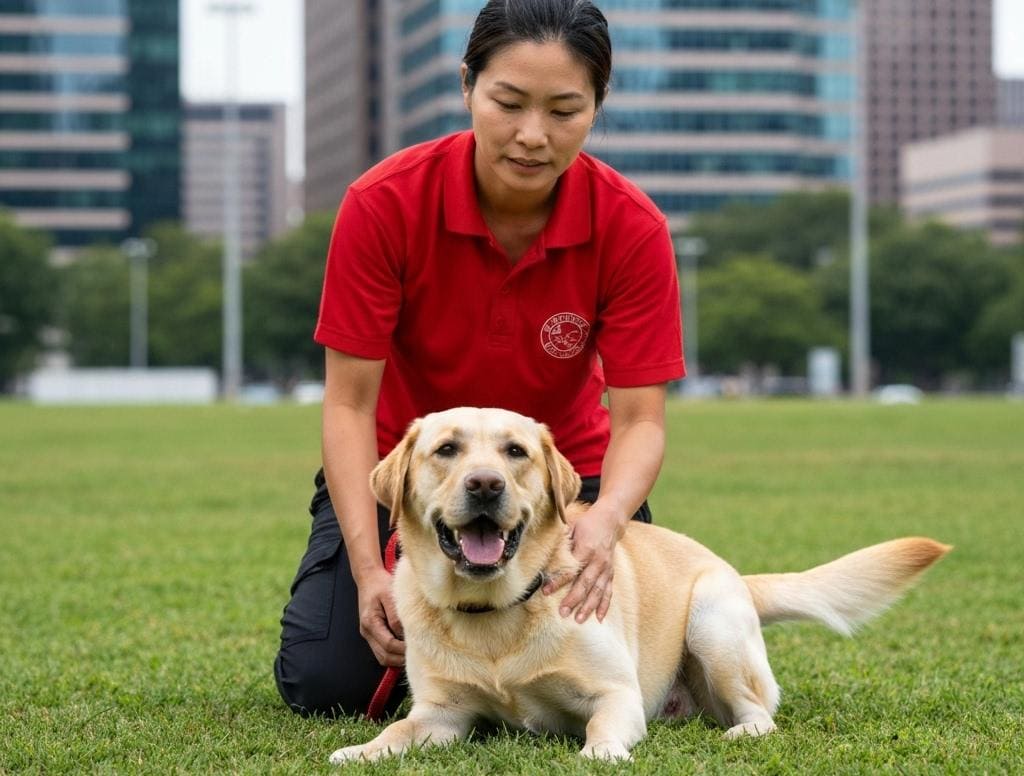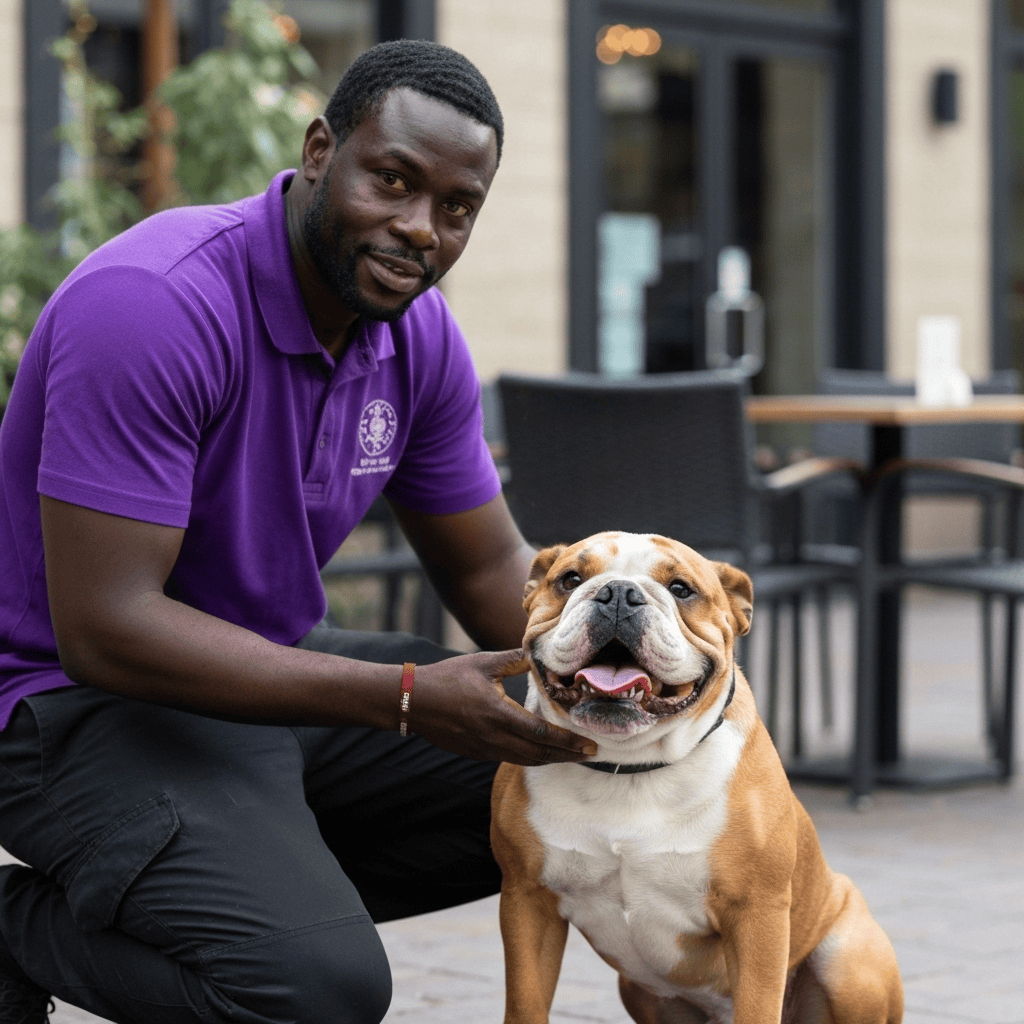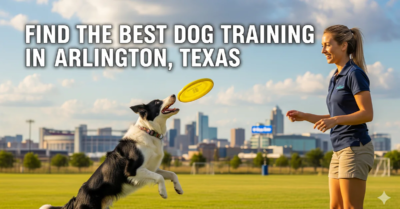Your Complete Guide to Choosing a Dog Trainer in Arlington, TX
Living with a dog in Arlington means navigating busy sidewalks near the Entertainment District, family parks, and miles of neighborhood trails. Your dog needs manners that work around crowds, game-day noise, and everyday distractions that come with this vibrant city.
If you’re comparing options for dog training in Arlington tx, here’s what matters locally. From Tarrant County rules to the best places around town to practice new skills, this guide will help you make the right choice for your pup.
How to Choose the Right Trainer
The best trainers use positive reinforcement and reward-based techniques. This approach builds trust between you and your dog while reducing fear and anxiety. More importantly, it gives you behaviors that actually stick when you’re dealing with real Arlington distractions like crowds at Globe Life Field or weekend festivals downtown.
When you’re shopping around, credentials can help you understand a trainer’s education and commitment to ethical methods. You can learn what common dog trainer certifications mean and look for designations like KPA-CTP, CPDT-KA, CBCC-KA, CTC, or IAABC-CDBC.
But here’s what really matters: ask how they’ll help your dog handle common Arlington scenarios. Think about those pre-game crowds near the stadium, busy sidewalks around Downtown Arlington, and weekend walks through packed neighborhood parks.
Most trainers serving Arlington work primarily in Tarrant County, though some neighborhoods fall into Dallas County. If you want in-home training, make sure to confirm any travel fees based on your specific address.
Common Dog Training Methods Explained

Positive reinforcement is straightforward. You reward the behaviors you want to see more of, so your dog naturally repeats them. It works particularly well for puppy training, basic manners like sitting politely for greetings, and teaching your dog to walk nicely on a leash without pulling.
For more serious issues like fear, reactivity toward other dogs, or aggression, good trainers use specialized behavior modification techniques. These methods focus on changing how your dog actually feels about their triggers through careful desensitization and counterconditioning. The best programs include thoughtful setups, maintaining safe distances, and making gradual progress at your dog’s pace.
Management prevents your dog from practicing unwanted habits while they’re learning. Baby gates, crates, and keeping your dog on leash help them make better choices while new skills are still developing.
A solid training plan brings everything together. Short, frequent practice sessions at home combined with real-world training around Arlington help your dog learn that good manners apply everywhere, not just in your living room.
Average Cost of ‘dog training in Arlington tx’ (Updated for 2025)
Pricing in Arlington and the greater Tarrant County area varies based on the trainer’s experience, session length, and whether you choose in-home visits, group classes, or day training services.
| Service Type | Typical Price in Arlington |
|---|---|
| Group class series, 4 to 6 weeks | $160 – $320 total |
| Private session, 60 to 90 minutes | $110 – $200 per visit |
| Puppy training package, 4 to 6 lessons | $350 – $700 total |
| Day training, trainer works your dog 3 to 5 days a week | $500 – $1,000 per week |
| Board and train, 2 to 4 weeks | $2,000 – $4,500 total |
| Behavior consultation for fear or reactivity | $140 – $260 for the first session |
You’ll typically pay higher rates for complex behavior cases or advanced training goals like off-leash reliability. Many trainers offer package discounts and flexible scheduling to work around Arlington’s busy lifestyle.
Arlington and Tarrant County Rules That Affect Training
Understanding local regulations keeps your training smooth and helps you avoid unnecessary stress or fines.
Leash and restraint laws require dogs to be controlled whenever they’re off your property. Plan on keeping your dog leashed during practice sessions outside of designated off-leash areas. You can find current guidelines at Arlington Animal Services.
Rabies vaccination is required by Texas law and must be kept current. Details about state requirements are available from Texas DSHS Rabies.
Microchip and identification requirements help reunite lost pets with their families. Keep your dog’s information current and check Arlington’s specific policies through Animal Services.
Noise and nuisance ordinances can affect dogs who bark excessively when left alone. Early training for alone-time skills and proper mental enrichment helps prevent these issues before they start.
Using parks for training is generally welcome for casual practice with leashed dogs. However, if your trainer wants to run commercial group activities, they may need to coordinate with Arlington Parks & Recreation.
Trainer licensing and insurance work differently in Texas than some other states. The state doesn’t issue special dog trainer licenses, but responsible professionals carry general liability insurance. Many venues will ask to see proof of coverage. Additional pet health resources for Tarrant County residents are available at Tarrant County Public Health.
Questions to Ask a Potential Dog Trainer
Before you commit to working with any trainer, here are the key questions that will help you make an informed choice:
- What training methods do you use to keep sessions positive and low stress?
- What specific experience do you have with my goals, whether that’s leash manners, reactivity, or something else?
- Do you hold credentials such as KPA-CTP or CPDT-KA, and how do you stay current with new training techniques?
- How will you structure a customized program for my specific dog and household situation?
- Where will we practice around Arlington once my dog is ready for more challenging distractions?
- What exactly is included in each session or package, and are there any travel or cancellation fees I should know about?
- How do you measure progress and decide when it’s time to make training more challenging?
- Do you carry liability insurance, and can you provide proof if a venue requests it?
- For behavior cases, do you work with my veterinarian if medical issues might be involved?
- What kind of daily homework should I expect to do between our training sessions?
Local Arlington Resources for Dog Owners

These local spots make practicing new skills easier and more enjoyable while you build good manners around real-life distractions.
Tails N’ Trails Dog Park offers large, fenced off-leash areas plus walking trails for leashed practice. Check current hours and specific rules with Arlington Parks & Recreation.
Rush Creek Dog Park features separate areas for small and large dogs, plus open space that’s perfect for working on recall training. Verify any updates or temporary closures through Parks & Recreation.
Mike Lewis Park Dog Park in nearby Grand Prairie makes for a nice change of scenery and new distractions when you want to test your dog’s skills. See City of Grand Prairie for current details.
River Legacy Park provides beautiful leashed walking routes that are perfect for practicing focus work around cyclists, joggers with strollers, and local wildlife. Find park information and upcoming events at River Legacy Foundation.
Arlington Entertainment District offers excellent sidewalk training opportunities near venues and event foot traffic. This area is ideal for advanced practice during non-peak times when crowds are manageable. Get visitor information at Arlington Convention & Visitors Bureau.
City support and pet services including licensing guidance, microchipping, and lost-and-found services are available through Arlington Animal Services.

FAQs
What certifications should I look for in Arlington?
Independent credentials signal that a trainer has invested in education and follows ethical guidelines. Common options include CPDT-KA, KPA-CTP, IAABC-CDBC, CBCC-KA, and CTC.
Do dog trainers need a license in Texas or Tarrant County?
No special trainer license exists in Texas. Trainers follow standard business regulations like any other service professional. Many carry liability insurance, especially when they’re conducting group training in public spaces.
Are there leash laws in Arlington?
Yes, dogs must be restrained and under control whenever they’re off your property. Keep your dog leashed outside of designated fenced dog parks and always follow posted rules in city parks. For the most current guidance, contact Arlington Animal Services.
What vaccinations are required?
Texas requires a current rabies vaccination for all dogs. Your veterinarian may recommend additional vaccines based on your dog’s lifestyle and risk factors. See Texas DSHS for statewide rabies information and requirements.
Where can I practice everyday manners in town?
Start with quiet neighborhood sidewalks where distractions are minimal, then gradually progress to busier areas like River Legacy Park or the Entertainment District during slower hours. Always bring high-value treats and keep your training sessions short and positive.
How long does training take?
Most puppies and adult dogs start showing noticeable progress within a few weeks when owners practice consistently every day. Behavior cases involving fear, anxiety, or aggression often take longer and require a more structured, step-by-step plan with regular professional coaching.
What should I bring to a group class?
Pack a flat collar or properly fitted harness, a standard 6-foot leash, plenty of small soft treats your dog loves, water for both of you, and proof of vaccinations if your trainer requests it. Leave retractable leashes at home since they can create safety issues in group settings.
Choosing the right training plan, methods, and practice locations will help your dog become a calm, confident companion who can handle everything Arlington and Tarrant County have to offer.
